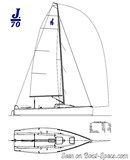J/70
Sailboat specifications
The J/70 is a 22’8” (6.93m) one design sailboat designed by Alan Johnstone (United States). She is built since 2012 by J/Boats (United States). She has been awarded "2013 - European Yacht of the Year: Special Yacht".
J/70's main features
- Model
- J/70
- Hull type
- Monohull
- Category
- One design sailboat
- Sailboat builder
- Sailboat designer
- Country
- United States
- Construction
- GRP (glass reinforced polyester):
Sandwich fiberglass polyester - First built hull
- 2012
- Last built hull
- Still in production
- Award(s)
- 2013: European Yacht of the Year: Special Yacht
- Appendages
- Lifting keel : fin with bulb, lifting
- Helm
- Single tiller
- Rudder
- Single transom hung rudder
- Unsinkable
- No
- Trailerable
- Yes
- EC design categoryiThe CE design category indicates the ability to cope with certain weather conditions (the sailboat is designed for these conditions)
A: Wind < force 9, Waves < 10m
B: Wind < force 8, Waves < 8m
C: Wind < force 6, Waves < 4m
D: Wind < force 4, Waves < 0,5m - C
- Standard public price ex. VAT (indicative only)
- About35 400 €(2020)
J/70's main dimensions
- Hull length
- 22’ 8”6.93 m
- Waterline length
- 20’ 6”6.24 m
- Beam (width)
- 7’ 5”2.25 m
- Draft
- 4’ 10”1.45 m
- Draft when appendages up
- 3’0.9 m
- Mast height from DWL
- 32’ 10”10 m
- Light displacement (MLC)
- 1753 lb795 kg
- Ballast weight
- 639 lb290 kg
- Ballast type
- Lead
J/70's rig and sails
- Upwind sail area
- 284 ft²26.38 m²
- Downwind sail area
- 657 ft²61.07 m²
- Mainsail area
- 173 ft²16.07 m²
- Jib area
- 111 ft²10.31 m²
- Asymmetric spinnaker area
- 484 ft²45 m²
- IiFore triangle height (from mast foot to fore stay top attachment)
- 26’ 10”8.16 m
- JiFore triangle base (from mast foot to bottom of forestay)
- 7’ 8”2.34 m
- PiMainsail hoist measurement (from tack to head)
- 26’ 1”7.97 m
- EiMainsail foot measurement (from tack to clew)
- 9’ 5”2.88 m
- Rigging type
- Sloop Marconi fractional
- Mast configuration
- Deck stepped mast
- Rotating spars
- No
- Number of levels of spreaders
- 1
- Spreaders angle
- Swept-back
- Spars construction
- Carbon fiber spars
- Standing rigging
- 1x19 strand wire continuous
J/70's performances
- Upwind sail area to displacementiThe ratio sail area to displacement is obtained by dividing the sail area by the boat's displaced volume to the power two-thirds.
The ratio sail area to displacement can be used to compare the relative sail plan of different sailboats no matter what their size.
Upwind: under 18 the ratio indicates a cruise oriented sailboat with limited performances especially in light wind, while over 25 it indicates a fast sailboat. - 331 ft²/T30.74 m²/T
- Downwind sail area to displacementiThe ratio sail area to displacement is obtained by dividing the sail area by the boat's displaced volume to the power two-thirds.
The ratio sail area to displacement can be used to compare the relative sail plan of different sailboats no matter what their size. - 766 ft²/T71.16 m²/T
- Displacement-length ratio (DLR)iThe Displacement Length Ratio (DLR) is a figure that points out the boat's weight compared to its waterline length. The DLR is obtained by dividing the boat's displacement in tons by the cube of one one-hundredth of the waterline length (in feet).
The DLR can be used to compare the relative mass of different sailboats no matter what their length:
a DLR less than 180 is indicative of a really light sailboat (race boat made for planning), while a DLR greater than 300 is indicative of a heavy cruising sailboat. - 93
- Ballast ratioiThe Ballast ratio is an indicator of stability; it is obtained by dividing the boat's displacement by the mass of the ballast. Since the stability depends also of the hull shapes and the position of the center of gravity, only the boats with similar ballast arrangements and hull shapes should be compared.
The higher the ballast ratio is, the greater is the stability. - 36 %
- Critical hull speediAs a ship moves in the water, it creates standing waves that oppose its movement. This effect increases dramatically the resistance when the boat reaches a speed-length ratio (speed-length ratio is the ratio between the speed in knots and the square root of the waterline length in feet) of about 1.2 (corresponding to a Froude Number of 0.35) . This very sharp rise in resistance, between speed-length ratio of 1.2 to 1.5, is insurmountable for heavy sailboats and so becomes an apparent barrier. This leads to the concept of "hull speed".
The hull speed is obtained by multiplying the square root of the waterline length (in feet) by 1.34. - 6.06 knots
J/70's auxiliary engine
- Engine(s)
- 1 outboard engine
- Engine(s) power (min./max.)
- 3 HP / 4 HP
- Fuel type
- Gas
J/70's accommodations and layout
- Cockpit
- Open aft cockpit
- Berth(s)
- 2












J/Boats J/70 interior and accommodations - - 11/11
Picture extracted from the commercial documentation © J/Boats
Picture extracted from the commercial documentation © J/Boats
Similar sailboats that may interest you:
Sailboats
First built hull
Hull length
1992
24’ 6”7.48 m
1982
23’ 4”7.1 m
1977
25’ 1”7.65 m
1992
24’ 6”7.48 m
2015
23’7 m
2009
19’ 11”6.07 m
2015
20’ 10”6.34 m
2015
20’ 10”6.34 m
2011
19’5.79 m
1993
24’7.32 m
2016
22’6.7 m
1993
26’ 2”8 m
2012
23’ 4”7.09 m
2006
24’7.32 m
1977
24’7.32 m